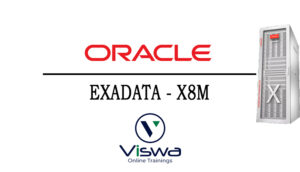Oracle DBA 12c | 19c Certification Training
One of the top providers of online IT training worldwide is VISWA Online Trainings. To assist beginners and working professionals in achieving their career objectives and taking advantage of our best services, We provide a wide range of courses and online training.
Learners : 1080
Duration : 30 Days
About Course
Oracle DBA is a group of data that is handled as a whole. A database’s main function is to store and retrieve relevant data. The database server holds the key to resolving information management issues. In a multiuser scenario, a server often manages a lot of data reliably so that multiple users can access the same material at once. Delivering excellent performance while accomplishing all of this. Additionally, Oracle DBA server offers effective solutions for failure recovery and guards against unauthorized access. Enrol today to earn your certification.
Oracle DBA Training Course Syllabus
✔ List the major architectural components of Oracle DBA
✔ Explain the memory structures
✔ Describe the background processes
✔ Understanding 12c multitenant architecture
✔ Exploring CDB and PDB databases
✔ Describe database administrator (DBA) role, explain typical tasks and tools
✔ Plan an Oracle software installation
✔ Install 12c Database software
✔ Plan database creation
✔ Create Multitenant Container and Pluggable Databases
✔ Create Oracle DBA using SQL Plus
✔ Understand database users & sample schemas
✔ Managing database using Oracle Enterprise Manager & SQL*Plus
✔ Commonly used Initialization Parameters
✔ Manage database initialization parameters – SP file & P file
✔ Describe the stages of database startup
✔ Start and stop the Oracle database and components
✔ Viewing Alert log & manage Trace files
✔ Understand Data Dictionary Views
✔ Access dynamic performance views
✔ Storage Structures
✔ Segments, Extents & Oracle block
✔ Describe the storage of table row data in blocks
✔ Create and manage Tablespaces
✔ Tablespaces and Datafiles
✔ Managing Tablespaces in CDBs and PDBs
✔ Oracle Managed Files (OMF)
✔ Managing Temporary Tablespace
✔ Create and manage database user accounts:
✔ Authenticate users
✔ Assign default storage areas (tablespaces)
✔ Grant and revoke privileges
✔ Create and manage roles
✔ Create and manage profiles
✔ Describe locking mechanism and how Oracle manages data concurrency
✔ Monitor and resolve locking conflicts
✔ Explain DML and undo data generation
✔ Monitor and administer undo data
✔ Difference between undo data and redo data
✔ Configure undo retention
✔ Guarantee undo retention
✔ Use the Undo Advisor
✔ Oracle Net Services
✔ Configure Listener & Create Oracle Net Service aliases
✔ Configure connect-time failover
✔ Control the Oracle Net Listener
✔ Use tnsping to test Oracle Net connectivity
✔ Identify when to use shared servers and when to use dedicated servers
✔ Configuring Communication between Databases
✔ Connecting to another Database using DB Links
✔ Identify the types of failure that can occur in an Oracle database
✔ Importance of checkpoints, redolog files, control files & archive log files
✔ Understanding what is COLD & HOT backup
✔ Configure ARCHIVELOG mode & Fast Recovery Area
✔ Invoke and configure Recovery Manager (RMAN)
✔ Specify Retention policy
✔ Usage of a Recovery Catalog over control file for the RMAN repository
✔ Create and configure a recovery catalog
✔ Register Database & Synchronize with recovery catalog
✔ Use RMAN stored scripts
✔ Enable control file autobackup
✔ Configure backup destinations
✔ Allocate channels for Disk & Tape destinations
✔ Configure backup optimization
✔ Create compressed & encrypted backups
✔ Create consistent database backups (offline/cold)
✔ Back up your database without shutting down (online/hot)
✔ Create image file backups
✔ Create a whole database backup
✔ Create a full database backup
✔ Enable fast incremental backup
✔ Create duplex backup sets
✔ Back up a backup set
✔ Create RMAN multi-section backup
✔ Create an archival backup for long-term retention
✔ Monitor Backup jobs, Manage backups and view backup reports
✔ Monitor the fast recovery area
✔ Determine the need for performing recovery
✔ Describe the causes of file loss and determine the appropriate action
✔ Describe major recovery operations
✔ Perform recovery:
✔ Control file
✔ Redo log file
✔ Data file
✔ Perform complete recovery when a critical or non-critical data file is lost
✔ Recover using incrementally updated backups
✔ Switch to image copies for fast recovery
✔ Recover using a backup control file
✔ Describe ways to move data
✔ Create and use directory objects
✔ Use SQL*Loader to load data from a non-Oracle database (or user files)
✔ Use external tables to move data via platform-independent files
✔ Explain the general architecture of Oracle Data Pump
✔ Use Data Pump Export and Import to move data between Oracle databases
✔ Describe Flashback technology
✔ Perform Flashback Query
✔ Use Flashback Version Query
✔ Perform Flashback Table operations
✔ Use Flashback Transaction Query
✔ Describe and use Oracle Total Recall
✔ Creating and Managing Flashback Data Archive (FDA)
✔ Describe and use flashback recycle bins
✔ Configure Flashback Database
✔ Perform Flashback Database operations
✔ Monitor Flashback Database
✔ Describe DBA responsibilities for security and auditing
✔ Enable standard database auditing
✔ Specify audit options
✔ Review audit information
✔ Maintain the audit trail
✔ Optimizer overview
✔ Manage optimizer statistics
✔ Manage the Automatic Workload Repository (AWR)
✔ Use the Automatic Database Diagnostic Monitor (ADDM)
✔ Describe and use the advisory framework
✔ Accessing & analyzing Active Session History data
✔ Use performance-related dynamic view & EM to monitor performance
✔ Managing Memory:
✔ Describe the memory components in the SGA
✔ Implement Automatic Memory Management
✔ Manually configure SGA parameters
✔ Configure automatic PGA memory management
✔ Maintaining different types of Indexes
✔ Managing Partition Tables
✔ SQL Tuning
✔ Row chaining & migration
✔ SQL trace, Tkprof, Explain plan
✔ Use the SQL Tuning Advisor to:
✔ Identify SQL statements that are using the most resources
✔ Tune SQL statements that are using the most resources
✔ Use the SQL Access Advisor to tune a workload
✔ Detect and repair database corruption
✔ Handle block corruption
✔ Set up Automatic Diagnostic Repository (ADR) & Run health checks
✔ Describe how the Oracle database server automatically manages space
✔ Save space by using compression
✔ Proactively monitor and manage tablespace space usage
✔ Describe segment creation in the Oracle database
✔ Control deferred segment creation
✔ Use the Segment Advisor
✔ Reclaim wasted space from tables and indexes by using segment shrink
✔ Manage resumable space allocation
✔ Use transportable tablespaces
✔ Describe the concepts of transportable databases
✔ Describe the benefits of using ASM
✔ Manage the ASM instance
✔ Create and drop ASM disk groups
✔ Extend ASM disk groups
✔ Retrieve ASM metadata by using various utilities
✔ List the purposes of creating a duplicate database
✔ Choose a technique for duplicating a database
✔ Duplicate a database with RMAN
✔ Dataguard Architecture & background processes
✔ Configuring & Managing Dataguard
✔ Configuring Dataguard failover
✔ Managing switchover
✔ Multitenant Container Database and Pluggable Databases
✔ Managing Tablespaces and Users in CDB and PDBs
✔ Backup, Recovery, and Flashback CDBs and PDBs
✔ Automatic Data Optimization and Storage Enhancements
✔ In-Database Archiving and Temporal
✔ Privilege Analysis new feature and new administrative privileges
✔ ADR and Network enhancements
✔ Oracle Data Redaction
✔ High Availability using RMAN
✔ Tables, Indexes, and Online Operations enhancements
✔ Major enhancements in Data Pump, SQL Loader & External tables
| Live Instructor Based Training With Software |
| Lifetime access and 24×7 support |
| Certification Oriented content |
| Hands-On complete Real-time training |
| Get a certificate on course completion |
| Flexible Schedules |
| Live Recorded Videos Access |
| Study Material Provided |
Oracle DBA Training - Upcoming Batches
7th NOV 2022
8 AM IST
Coming Soon
AM IST
5th NOV 2022
8 AM IST
Coming Soon
AM IST
Don't find suitable time ?
CHOOSE YOUR OWN COMFORTABLE LEARNING EXPERIENCE
Live Virtual Training
-
Schedule your sessions at your comfortable timings.
-
Instructor-led training, Real-time projects
-
Certification Guidance.
Self-Paced Learning
-
Complete set of live-online training sessions recorded videos.
-
Learn technology at your own pace.
-
Get access for lifetime.
Corporate Training
-
Learn As A Full Day Schedule With Discussions, Exercises,
-
Practical Use Cases
-
Design Your Own Syllabus Based
Oracle DBA Online Training FAQ'S
- The SGA is a distributed memory that several programs can use. This section contains data that the instance needs to function.
- System Global Area (SGA), a distributed memory space on RAM, and applications running make up an instance.
- The running processes are OS processes, and every program in the instance has a specific role to play.
- When an instance is “started,” it creates the GAS and runs processes
- A data block is a database object’s basic logical storage unit. As objects expand in size, they require extra storage in the form of continuous data blocks.
- Extents are collections of consecutive data chunks.
For the needs of business computing, Oracle’s grid design combines a sizable database server, memory, and connectivity to produce a tailored, as-needed computing resource. The grid computing architecture continuously assesses resource consumption and modifies supply as necessary.
A grid of various connected database servers, for instance, might be used to run multiple programmes simultaneously. The database administrator might automatically assign a dedicated server to that programme to handle the escalating demands if monthly reports are overdue.
Advanced workload management techniques used in grid computing allow programmes to collaborate across multiple servers. Resources within a region can be offered dynamically and data processing capacity can be increased or eliminated as needed. Web services make it possible to quickly integrate apps to launch a business.
Get ahead in your career by learning Oracle DBA through VISWA Online Trainings
It is the process of structuring a relational database’s fields and tables to reduce complexity and dependence. It guarantees that our data is consistent by saving the memory.
- First normal form – Only single (atomic) valued attributes or columns should be used. A column’s values must all belong to a certain domain.
- Second normal form – It must be written in First Normal. It should also not be partially dependent.
- Third normal form – It’s in the shape of the Second Normal. It also lacks transitive dependencies.
- Boyce and Codd Normal Form – Boyce and Codd is a more advanced variation of the Third Normal Form. This form is used to deal with anomalies that aren’t addressed by 3NF. BCNF refers to a 3NF table that does not contain several identical candidate keys
Bind variables are crucial because most database suppliers provide an execution plan cache, which stores recently processed SQL statements and planning processes for again use.
Reviews
 Lavanya Posina2024-09-30To get the SAP S4HANA MM training is really worth from VISWA Technologies. I would like to thank you for providing an excellent training.
Lavanya Posina2024-09-30To get the SAP S4HANA MM training is really worth from VISWA Technologies. I would like to thank you for providing an excellent training. Krishna Grandhi2024-09-19I attended PBCS course. Trainer has good knowledge and his explanation is easy to understand. The support team is also supportive during the training period. Overall experience is good.
Krishna Grandhi2024-09-19I attended PBCS course. Trainer has good knowledge and his explanation is easy to understand. The support team is also supportive during the training period. Overall experience is good. Siddhartha Mothukuri2024-09-10Learnt SAP EWM and it has been a really good experience with VISWA Online Trainings and trainer has been excellent in terms of his understanding in business as well as SAP. Thank you
Siddhartha Mothukuri2024-09-10Learnt SAP EWM and it has been a really good experience with VISWA Online Trainings and trainer has been excellent in terms of his understanding in business as well as SAP. Thank you Lakshmiprasanna Annem2024-08-01Thanks chaitanya arrange for sap bw on Hana job support. I will recommend definitely anyone.
Lakshmiprasanna Annem2024-08-01Thanks chaitanya arrange for sap bw on Hana job support. I will recommend definitely anyone. VINOD reddy2024-07-23Amazing Oracle Transportation Management (OTM) training! Definitely recommend.
VINOD reddy2024-07-23Amazing Oracle Transportation Management (OTM) training! Definitely recommend. Arvind P2024-06-28Good institute. Very responsible. As a trainer I got a good experience with them
Arvind P2024-06-28Good institute. Very responsible. As a trainer I got a good experience with them srinivasulu p2024-05-14I have recently enrolled azure cloud security training. There was lots of interaction sessions. It was best online learning platform.
srinivasulu p2024-05-14I have recently enrolled azure cloud security training. There was lots of interaction sessions. It was best online learning platform. Mahendra Reddy2024-05-14I would definitely recommend it anyone looking for generative AI course. This is friendly course thanks phani kumar
Mahendra Reddy2024-05-14I would definitely recommend it anyone looking for generative AI course. This is friendly course thanks phani kumar




